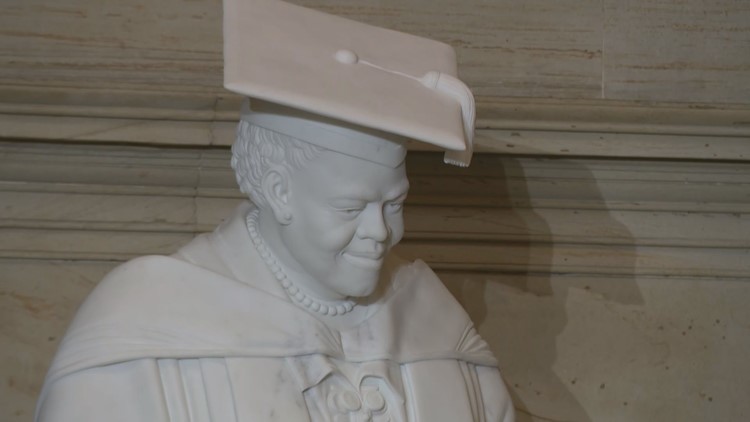WASHINGTON D.C., DC — Many describe Mary McLeod Bethune as an influential civil rights icon, educator, author, philanthropist, humanitarian and women's rights activist. She continues to make history by becoming the first African American to represent a state in National Statuary Hall in the U.S. Capitol.
In 2019, Florida Gov. Ron DeSantis formally asked for the statue of confederate Gen. Edmund Kirby Smith in the National Statuary Hall at the U.S. Capitol to be replaced with one of Bethune.
She will be the first African American person to have a state-commissioned statue in the hall. Statues of other African Americans in the hall, such as Frederick Douglass and Rosa Parks, were commissioned by Congress.
Dr. Bethune will also join women’s rights activist Sojourner Truth, whose memorial bust was unveiled in 2009 in the Emancipation Hall in the U.S. Capitol Visitor’s Center, as the first African American woman to be honored with busts in the United States Capitol.
Known as the "The First Lady of Struggle" because of her commitment to Civil Rights, Bethune was born to former slaves, Samuel and Patsy McLeod, on July 10, 1875, near Maysville, South Carolina.
According to an article by the National Women's History Museum, Bethune could pick 250 pounds of cotton a day by the age of nine. During the age of reconstruction, Bethune benefited from many of the efforts to educate African Americans after the war.
Later in Bethune's life, the article explained, she would move to Palatka, Florida, and open a boarding school, the Daytona Beach Literary and Industrial School for Training Negro Girls.
Eventually, her school would become a college, currently known as Bethune-Cookman University, a private historically-Black university.
“Dr. Mary McLeod Bethune was more than a notion…She was fearless. It is appropriate that her statue will replace that of a Confederate General, who fought to keep her family and her community enslaved, while the work she did throughout her life helped to keep freedom available for so many," said Dr. Bethune's granddaughter, Dr. Evelyn Bethune. "My grandmother was courageous and a visionary, far ahead of her time. She was not blinded by the light of accolades, but clearly pushed past the established limits of her time to improve the lives of African Americans; and, in doing so, improved the quality of life for all Americans.”
Dr. Bethune also made history by becoming the highest ranking African American official in government when she was director of Negro Affairs in the National Youth Administration under President Franklin D. Roosevelt’s administration, said The Daytona Times in an article.
The Times also said Bethune founded the National Council of Negro Women, was at the founding conference of the United Nations, and served as national vice president of the NAACP.
Her statue will stand 11 feet tall and is made of marble from the same Tuscan quarry that Michelangelo used from the Italian Alps, according to the Orlando Sentinel.



